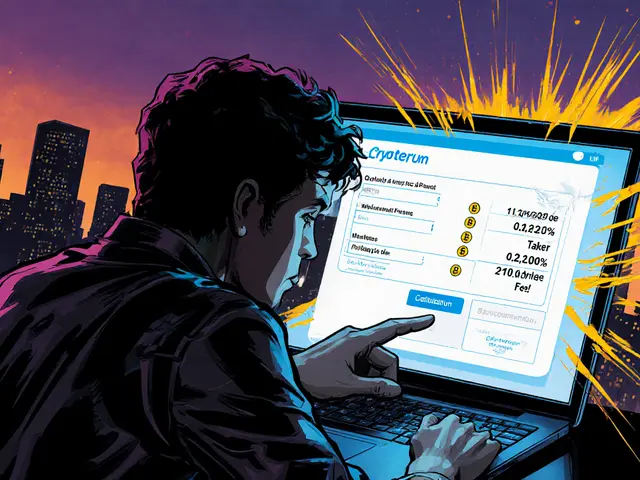Nigerian SEC Crypto Licensing Requirements for Exchanges - Full Guide
Nigerian SEC Crypto Exchange Licensing Calculator
Enter values and click "Check Compliance" to see if your exchange meets the minimum requirements.
- Minimum Paid-Up Capital ₦500 million
- Fidelity Bond 25% of capital
- Liquidity Reserve 10% of daily volume
- SEC Registration DAX License
Understanding Nigerian SEC crypto licensing is crucial for anyone looking to launch a digital asset exchange in Nigeria. The regulatory landscape shifted dramatically with the Investments and Securities Act 2025, which now treats cryptocurrencies as securities and places them under the strict oversight of the Nigerian Securities and Exchange Commission (SEC) the government body charged with supervising digital asset exchanges, enforcing compliance, and protecting investors. This guide walks you through every step you’ll need to clear before you can operate legally.
Why the New Framework Matters
Before 2025, most crypto trading in Nigeria happened on peer‑to‑peer platforms with little official supervision. The new Act does three things:
- Recognises digital assets as securities, bringing them under SEC jurisdiction.
- Creates a clear licensing pathway for exchanges, known as the Digital Asset Exchange (DAX) registration.
- Establishes robust AML/CFT and KYC rules that align with Central Bank of Nigeria (CBN) guidance.
For entrepreneurs, this means a formal, repeatable process - and for users, a higher level of protection.
Step‑by‑Step Licensing Process
- Assess Eligibility: You must be a registered Nigerian entity (or a foreign entity with a registered Nigerian subsidiary) and intend to operate a Digital Asset Exchange (DAX).
- Prepare Capital: Secure the minimum paid‑up capital of ₦500million (≈$325,000) and a fidelity bond covering at least 25% of that amount.
- Compile Documentation: Gather incorporation papers, MEMART clauses, audited financials, and a detailed business plan.
- Submit Application: File the DAX application through the SEC’s online portal, attaching all required documents and paying the filing fee.
- SEC Review & Provisional License: The SEC may grant a provisional license under the Accelerated Regulatory Incubation Programme (ARIP) while it verifies your infrastructure.
- Full Clearance: After successful compliance testing, receive the final DAX license, allowing you to list approved assets.
Each step has its own checklist; missing a single item can add weeks to the timeline.
Capital, Bond, and Financial Guarantees
The financial thresholds are non‑negotiable. Here’s a quick breakdown:
| Requirement | Minimum Amount | Accepted Forms |
|---|---|---|
| Paid‑up Capital | ₦500million | Bank balance, quoted securities, fixed‑asset valuation |
| Fidelity Bond | ₦125million (25% of capital) | Surety company bond, cash escrow |
| Liquidity Reserve | 10% of daily transaction volume (estimated) | Cash or liquid marketable securities |
All funds must be sourced from legitimate activities, and the SEC conducts a provenance check before approving the capital deposit.
Documentation Checklist
Submitting a clean, complete dossier speeds up the SEC review. Use this list as a pre‑flight check:
- Certificate of Incorporation from the Corporate Affairs Commission (CAC).
- Memorandum and Articles of Association (MEMART) explicitly mentioning cryptocurrency exchange activities.
- CAC Forms 1.1, 7, and any sector‑specific filings.
- Audited financial statements for the most recent fiscal year (or a statement of affairs for a brand‑new company).
- Detailed business plan covering technology stack, risk management, and market strategy.
- Proof of paid‑up capital and fidelity bond (bank statements, bond certificates).
- AML/CFT policies, KYC procedures, and data‑privacy framework.
- IT security audit report (penetration testing, code review, disaster recovery).
- Board of directors’ CVs and a governance charter.

Compliance Pillars: AML, CFT & KYC
The SEC has delegated day‑to‑day AML/CFT monitoring to the Central Bank of Nigeria (CBN), but exchanges remain fully accountable. Key compliance actions include:
- Customer Identification: Collect full name, government ID, proof of address, and a selfie for facial verification.
- Transaction Monitoring: Flag transactions exceeding ₦2million (≈$4,000) or any patterns that resemble layering.
- Suspicious Activity Reporting (SAR): Submit reports within 48hours of detection to the Financial Intelligence Unit (FIU).
- Record‑keeping: Maintain records for at least five years, secure in an encrypted, access‑controlled environment.
Non‑compliance can trigger fines up to ₦10million per breach, or revocation of the DAX license.
Operational Restrictions You Must Follow
Even with a license, the SEC imposes strict operational limits:
- No Direct Financial Assistance: You cannot fund customers’ trades or offer credit for purchasing crypto.
- No‑Objection Rule: Every token you wish to list must receive prior SEC approval. The process involves a token‑screening questionnaire and a review of the token’s legal status.
- Foreign Targeting Rules: Non‑Nigerian operators must not market directly to Nigerian residents without a local subsidiary or partner that holds a DAX license.
- Tax Reporting: The SEC is aligning with the upcoming tax amendment, meaning you’ll need to share transaction data for tax‑collection purposes.
Violations attract penalties ranging from ₦1million fines to criminal prosecution for fraudulent schemes.
Accelerated Regulatory Incubation Programme (ARIP)
Launched in June 2024, ARIP fast‑tracks provisional licensing for promising startups. The programme offers:
- Dedicated SEC liaison for real‑time feedback.
- Reduced processing time (average 30days vs. 90‑day standard).
- Mentorship on AML systems, token‑listing compliance, and governance.
Only two firms-Quidax and Busha-have secured provisional licenses so far. If you qualify as a “high‑impact” fintech, applying through ARIP could shave months off your go‑to‑market plan.
Common Pitfalls and How to Avoid Them
Even seasoned operators stumble. Here are the most frequent mistakes and quick fixes:
- Under‑estimating Capital Requirements: Some founders try to meet the ₦500million threshold with illiquid assets. Convert at least 70% of the capital into cash or marketable securities before filing.
- Missing MEMART Language: The SEC rejects incorporation documents that lack explicit crypto‑exchange clauses. Amend your MEMART early and have a legal counsel review it.
- Weak AML Policies: Generic “KYC” checklists won’t cut it. Build a risk‑based AML framework, integrate third‑party verification APIs, and conduct regular staff training.
- Skipping the No‑Objection Process: Listing a token without SEC clearance leads to immediate suspension. Use the SEC’s online token‑screening portal before any marketing.
- Ignoring Ongoing Reporting: The SEC requires quarterly compliance reports. Set up automated reporting pipelines to avoid missed deadlines.
Quick Takeaways
- Minimum paid‑up capital: ₦500million; fidelity bond: ₦125million.
- All documentation must be filed through the SEC portal - incomplete packages delay approval.
- AML/KYC must align with CBN guidelines; SARs are mandatory.
- Operational rules forbid financial assistance, require prior token approval, and impose strict foreign‑marketing limits.
- ARIP can accelerate licensing; consider applying if you’re a startup with innovative tech.

Frequently Asked Questions
Do I need a Nigerian subsidiary if I’m a foreign exchange?
Yes. The SEC requires any non‑resident entity that targets Nigerian users to register a local subsidiary that holds a DAX license. Direct marketing without a local partner is prohibited.
How long does the standard licensing process take?
Typically 90days from submission of a complete dossier. Applications processed through ARIP average 30days.
What happens if my token is rejected under the No‑Objection Rule?
You must remove the token from your platform immediately. Continued listing after rejection can trigger a suspension of your DAX license and hefty fines.
Is the fidelity bond refundable?
The bond remains active as long as you hold a DAX license. If you voluntarily surrender the license, you can claim a refund after clearing any outstanding regulatory fees.
Are there any tax reporting obligations linked to the SEC license?
Yes. The SEC is preparing a tax‑collection amendment. Licensed exchanges will soon be required to submit quarterly transaction summaries to the Federal Inland Revenue Service for tax assessment.








Great rundown on the Nigerian SEC requirements. The capital thresholds are clear and the step‑by‑step guide helps anyone planning an exchange. Keeping the liquidity reserve in mind will save a lot of back‑and‑forth later.
The guide really shines a light on how Nigeria is shaping its crypto future. It’s cool to see the SEC finally treating digital assets like securities. The ARIP program looks like a solid boost for startups looking to move fast. Hope more exchanges get the chance to test the waters.
Reading through the licensing steps feels like navigating a labyrinth where every turn reveals a new treasure of detail. The insistence on a 500 million ₦ capital isn’t just a number – it’s the backbone of market credibility. I love how the document forces founders to think about liquidity like a living organism that must breathe. The no‑objection rule reminds us that tokens aren’t just code; they’re regulated assets that demand respect.
From a compliance engineer’s perspective, the checklist is pure gold. The requirement to embed crypto‑exchange clauses into the MEMART is a classic case of regulatory foresight meeting corporate governance. The 25 % fidelity bond acts as a risk‑mitigation buffer, ensuring that any breach has financial backing. This framework, while stringent, is exactly what the market needs to mature responsibly.
oh great another 500 million requirement, because nobody has that lying around in a garage.
While the capital demand may seem steep, it is intended to safeguard investor confidence and ensure market stability. The SEC’s approach mirrors global best practices, aligning Nigeria with jurisdictions that have successfully integrated digital assets.
Honestly the whole thing feels like a drama series – you’ve got the big money, the bond, the liquidity reserve, and then a cliffhanger about token approval. If you survive all that, you’re basically a hero in the crypto world.
This guide is a waste of time, just another way for the SEC to choke startups. All that paperwork and bond are just barriers to keep us out.
Talk about overregulation – they’re trying to kill innovation.
Let me break this down for anyone still feeling overwhelmed by the sheer volume of requirements. First, the capital threshold of ₦500 million is not just a figure; it acts as a financial backbone that signals to investors that the exchange can weather market volatility. Second, the fidelity bond, pegged at 25 % of that capital, serves as a safety net, ensuring that any potential missteps have a guaranteed remedy. Third, the liquidity reserve, calculated at 10 % of daily transaction volume, guarantees that users can always withdraw or trade without facing illiquid bottlenecks. Fourth, the documentation checklist is exhaustive – from the Certificate of Incorporation to the AML/CFT policies – each piece plays a pivotal role in building a transparent operational framework. Fifth, the no‑objection rule effectively places token listings under a regulatory microscope, protecting users from malicious or unvetted projects. Sixth, the ARIP program isn’t just a fast‑track; it’s a mentorship pipeline that pairs fledgling exchanges with seasoned compliance experts. Seventh, ongoing reporting – quarterly compliance statements and SAR submissions – ensures that the exchange remains accountable long after the license is granted. Eighth, the prohibition on providing direct financial assistance to customers safeguards against unchecked credit exposure. Ninth, foreign operators must establish a Nigerian subsidiary, a move that grounds foreign capital in local jurisdiction. Tenth, tax reporting obligations are looming on the horizon, meaning exchanges must be ready to feed data to the Federal Inland Revenue Service. Eleventh, the SEC’s partnership with the CBN for AML oversight creates a dual‑layered monitoring system that reinforces anti‑money‑laundering efforts. Twelfth, the requirement for a robust IT security audit signals that cybersecurity is non‑negotiable in this space. Thirteenth, the governance charter and board CVs enforce corporate responsibility at the highest level. Fourteenth, the 90‑day standard processing timeline can be cut to 30 days via ARIP, but only if you have all documents pristine. Fifteenth, missing any single item can add weeks to your timeline, so double‑check every line. In short, while the road to a DAX license is steep, each hurdle is designed to build a resilient, trustworthy crypto ecosystem in Nigeria. Stay focused, keep your paperwork tidy, and you’ll emerge with a license that opens doors to a burgeoning market.
All that optimism is naive; the real world will crush you if you slip on any of those requirements.
It’s disheartening to see so much focus on compliance when the industry should be about innovation. The moral high ground of regulation often blinds us to the entrepreneurial spirit that drives real change.
Look, the SEC’s checklist is massive but it’s the only way to prevent scams and keep the market legit. If you’re serious, you’ll follow it.
Absolutely! 🚀 The detailed steps make the whole process feel manageable, and the ARIP program is a fantastic boost for startups. Keep pushing forward, you’ve got this! 🙌
Honestly, if you don’t have the capital and the paperwork ready, you might as well stop dreaming and pick a different career. The bar is just too high for most.
While the capital requirements are indeed formidable, they serve as a safeguard for both investors and the broader ecosystem. It is crucial to approach this process with meticulous preparation to ensure compliance and long‑term success.
Do you really think the SEC isn’t being used as a tool for larger financial interests to suppress decentralized finance? The whole licensing scheme smells like a covert operation to consolidate power.
I find the structured approach helpful; it forces founders to think deeply about risk management and governance before launching. A disciplined foundation often leads to sustainable growth.
Regulation is just a fancy word for red tape.